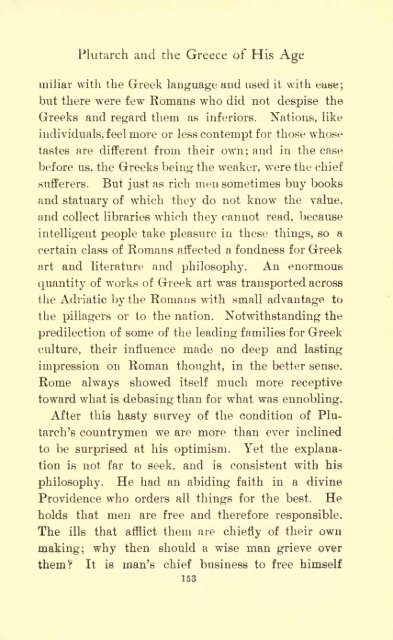Between Heathenism and Christianity - College of Stoic Philosophers
Between Heathenism and Christianity - College of Stoic Philosophers
Between Heathenism and Christianity - College of Stoic Philosophers
Create successful ePaper yourself
Turn your PDF publications into a flip-book with our unique Google optimized e-Paper software.
Plutarch <strong>and</strong> the Greece <strong>of</strong> His Age<br />
uiiliar with the Greek language aiid used it with ease;<br />
but there were few Romans who did not despise the<br />
Greeks <strong>and</strong> regard them as inferiors. Nations, like<br />
individuals, feel more or less contempt for those whose<br />
tastes are different from their own: <strong>and</strong> in the case<br />
before us. the Greeks being the weaker, were the chief<br />
sufferers.<br />
But just as rich men sometimes buy books<br />
<strong>and</strong> statuary <strong>of</strong> which they do not know the value,<br />
<strong>and</strong> collect libraries which they cannot read,<br />
because<br />
intelligent people take pleasure in these things, so a<br />
certain class <strong>of</strong> Romans affected a fondness for Greek<br />
art <strong>and</strong> literature <strong>and</strong> philosophy. An enormous<br />
quantity <strong>of</strong> works <strong>of</strong> Greek art was transported across<br />
the Adriatic by the Romans with small advantage to<br />
the pillagers or to the nation. Notwithst<strong>and</strong>ing the<br />
predilection <strong>of</strong> some <strong>of</strong> the leading families for Greek<br />
culture, their influence made no deep <strong>and</strong> lasting<br />
impression on Roman thought,<br />
in the better sense.<br />
Rome always showed itself much more receptive<br />
toward what is debasing than for what was ennobling.<br />
After this hasty survey <strong>of</strong> the condition <strong>of</strong> Plu<br />
tarch s countrymen we are more than ever inclined<br />
to be surprised at his optimism. Yet the explana<br />
tion is not far to seek, <strong>and</strong> is consistent with his<br />
philosophy. He had an abiding faith in a divine<br />
Providence who orders all things for the best. He<br />
holds that men are free <strong>and</strong> therefore responsible.<br />
The ills that afflict them are chiefly <strong>of</strong> their own<br />
making; why then should a wise man grieve over<br />
them? It is man s chief business to free himself<br />
153
















